There are already many good answers here, but I would like to add one very important factor as well as a summary. UDP can achieve a much higher throughput with the correct tuning because it does not employ congestion control. Congestion control in TCP is very very important. It controls the rate and throughput of the connection in order to minimize network congestion by trying to estimate the current capacity of the connection. Even when packets are sent over very reliable links, such as in the core network, routers have limited size buffers. These buffers fill up to their capacity and packets are then dropped, and TCP notices this drop through the lack of a received acknowledgement, thereby throttling the speed of the connection to the estimation of the capacity. TCP also employs something called slow start, but the throughput (actually the congestion window) is slowly increased until packets are dropped, and is then lowered and slowly increased again until packets are dropped etc. This causes the TCP throughput to fluctuate. You can see this clearly when you download a large file.
Because UDP is not using congestion control it can be both faster and experience less delay because it will not seek to maximize the buffers up to the dropping point, i.e. UDP packets are spending less time in buffers and get there faster with less delay. Because UDP does not employ congestion control, but TCP does, it can take away capacity from TCP that yields to UDP flows.
UDP is still vulnerable to congestion and packet drops though, so your application has to be prepared to handle these complications somehow, likely using retransmission or error correcting codes.
The result is that UDP can:
- Achieve higher throughput than TCP as long as the network drop rate is within limits that the application can handle.
- Deliver packets faster than TCP with less delay.
- Setup connections faster as there are no initial handshake to setup the connection
- Transmit multicast packets, whereas TCP have to use multiple connections.
- Transmit fixed size packets, whereas TCP transmit data in segments. If you transfer a UDP packet of 300 Bytes, you will receive 300 Bytes at the other end. With TCP, you may feed the sending socket 300 Bytes, but the receiver only reads 100 Bytes, and you have to figure out somehow that there are 200 more Bytes on the way. This is important if your application transmit fixed size messages, rather than a stream of bytes.
In summary, UDP can be used for every type of application that TCP can, as long as you also implement a proper retransmission mechanism. UDP can be very fast, has less delay, is not affected by congestion on a connection basis, transmits fixed sized datagrams, and can be used for multicasting.
